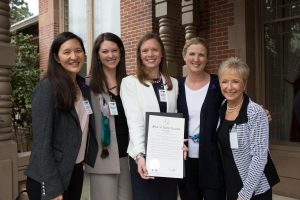
UNC Lineberger breast cancer physicians and researchers spoke Monday at the N.C. Executive Mansion at a luncheon held to mark the declaration of April as Metastatic Breast Cancer Awareness Month by N.C. Gov. Roy Cooper.
Cooper declared April as Metastatic Breast Cancer Awareness Month in North Carolina to bring attention to this second-leading cause of cancer death among women. First Lady Kristin Cooper read the proclamation during the luncheon, which was hosted by the North Carolina Oncology Navigator Association to honor metastatic breast cancer patients.
“We’re shining a light on metastatic breast cancer to raise awareness for those living with the disease, and to encourage continued advances in research and treatment,” Cooper said in a statement.
Metastatic breast cancer, which is incurable but treatable, occurs when cancer has spread beyond the breast to other organs. Up to 30 percent of North Carolinians diagnosed with breast cancer will develop metastatic breast cancer, even up to 20 years after remission, said Stephanie Wheeler, PhD, a UNC Lineberger member and associate professor in the UNC Gillings School of Global Public Health. Due to effective therapies, people with metastatic breast cancer can live for many years, but survival rates vary by income, race and geography, she also said.
“We are currently doing work at UNC to understand how to mitigate these issues; specifically, we are exploring how patients and their caregivers manage the out-of-pocket cost burden of their disease and how they navigate the finances of cancer care, with the intention of creating processes to better monitor financial toxicity and triage women for financial assistance and support,” Wheeler said.
Wheeler and other researchers and physicians from UNC Lineberger and the Duke Cancer Institute were involved in panel discussions during the event, as well as a metastatic breast cancer patient and a representative of the American Cancer Society Cancer Action Network.
Jean Sellers, RN, MSN, administrative clinical director at the UNC Cancer Network and president of the North Carolina Oncology Navigator Association, said raising awareness about the disease will lead to greater support.
“Our goal is to expand the conversation about metastatic breast cancer,” she said in a statement. “North Carolinians with this disease are facing treatment for the rest of their lives, all while potentially still working, caring for their families and engaging with their communities. While I am hopeful that we will one day have a cure, we want to empower our patients and create an environment in which they and their families feel supported.”
